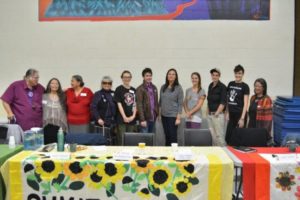Chippewas of the Thames fundraising and sharing information on Duty to Consult challenge at Supreme Court in Ottawa

Submitted by Shirley Honyust/ Yenatli:yo
LONDON–Tina Stevens from Kettle Point First Nation, Indigenous member of the Council of Canadians local London Chapter, arranged for a fundraiser/information session through a panel of presenters at N`Amerind Friendship Centre on November 19, 2016.
This fundraiser was just 11 days before Chippewas of the Thames goes to the Supreme Court in Ottawa to challenge the Canadian Government’s approach to consultation, arguing that based on Treaty and Canadian Law, the Federal Government is directly responsible for consulting Indigenous communities on projects that will affect them. Efforts were made to accommodate all guests, which numbered into a standing-room-only crowd.
Council of Canadians is an action-oriented body who work to protect Canadian independence and natural environment by promoting progressive policies on fair trade (and against free trade), clean water, energy security, public health care, and other issues of social, environmental, and economic concern to Canadians. They develop creative campaigns to put some of the country’s most important issues into the spotlight. The London Council Chapter works with a network of over 70 volunteer chapters to organize speaking tours, days of action, conferences and demonstrations.
Keynote speakers included: Chief Leslee White-Eye; Grandmothers Marie Short and Corrine Tooshkenig; Theo Blackbird-John; Rachel Thevenard; Sarah Scanlon and spoken word poet, Cortney Dakin (also known as Sakihitowin Awasis).
Dan and Mary Lou Smoke did a traditional opening and acknowledgement of the people of the land, after which Chief White-Eye (Chippewas of the Thames) spoke about the demand for dialogue. After one and a half years, the question remains: What can we do in terms of the 94 recommendations of Truth and Reconciliation Commission?
Chief White-Eye went on to say “Discussions have taken place regarding treaty rights and water, and everyday there is something to do to bring attention to the value of water. Aboriginal and treaty rights are on the hook!”
“This has happened because we have been compliant,” added Chief White-Eye. “When the water was found to be diluted, it was treated with water treatment centres. Now those measures are found not enough. We are the ones who made the water sick–we accepted those measures. Children today have grown up never knowing a pure water source.”
Chief White-Eye made this recommendation to the audience: “Find your relationship to the land and the water through First Nations Peoples because we are the ones who can most clearly articulate that relationship. We invite you to join us in Ottawa on November 30th in support of our court case.”
Grandmothers Marie Short and Corrine Tooshkenig, from Walpole Island, spoke about their first-hand involvement in support of the community protesting the illegal dumping of toxic waste by-products at Walpole Island by those contracted to dispose of them.
Theo Blackbird-John, also from Walpole Island, delivered knowledge with passion about the very real risk of privatization of the resources: natural gas and hydro, emphasizing especially that Hydro One must not be allowed to purchase the sole rights to hydro and water.
Rachel Thevenard supported Chief White-Eye’s statement that “this happens because we allow it to happen…” and “people won’t hold the government accountable”. She drew for the listeners a visual map of the linkages between Line 9 Pipeline and the 15 to 18 First Nations who are in opposition to it.
“What”, she asked, “can we do when we put our minds together? We can support the buses and car pools [to Ottawa] and share rides with others in need of transportation to show support for First Nations Peoples to repatriate the resources.”
Sarah Scanlon spoke candidly about her activism and involvement, which landed her a night in Sarnia Jail, in support for First Nations Peoples, urging people who may be visiting Sarnia to first research the online document,” Toxic Tour of Chemical Valley”. She also recommended “Violence on the land, Violence on our Bodies”, highlighting the work of Vanessa Grey on Aamjiwnaang Solidarity Against Chemical Valley.
In wrapping up the discussion, Cortney Dakin (Sakihitown Awasis), delivered two of her most recent spoken-word poetry, “The Beast” and “Oshkimaadzig” (the new people of the 7th fire).
Dan and Mary Lou did the closing, thanking people for attending and for opening their hearts and minds to the important message being shared, and wishing the attendees safe travel home again.
To learn more about the ongoing efforts, google Chippewas Solidarity, and find out about rally happening in Ottawa on November 30th.

